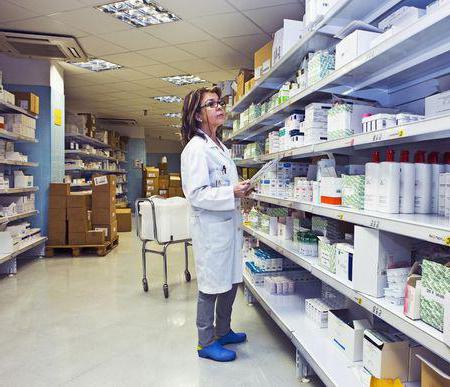Probably, any of us had to return the purchased goods to the store. And it’s not even a matter of defects - thanks to the increased level of legal literacy, we now know about our right to return a completely high-quality product that did not fit in certain parameters.
Medical Consumers
But not everyone is sure of a similar right with respect to medical goods. Can I return a product purchased at a pharmacy? Let's try to fill this annoying gap and finally figure out how legitimate the attempts of this return can be. That is, can we return the goods of the proper quality to the pharmacy and is it possible to hand over such products to the supplier.
Imagine the situation: you purchased a certain drug in a pharmaceutical institution with a normal shelf life, but at home, having studied the instructions in detail, you were convinced that for some reason it was not suitable for you or even contraindicated, and categorically. Suppose a dangerous side effect is detected in the presence of a disease that you just have.
What to do? Carry a purchase back? What to refer to? What is a good reason and what is not? Who is to blame for what happened? Sometimes the buyer is ready to give up and say goodbye to the amount paid, often very, very solid.

Let's understand
So, is it possible to return the goods to the pharmacy? The law adopted in our country states that medicinal products cannot be returned and exchanged. This is confirmed by order number 785 of the Ministry of Health and Social Development, adopted in 2005. Government Decision No. 55 (1998), on the basis of which this regulatory act was adopted, provides a list of goods that are not subject to return to the pharmacy. This is a list of quality items and items related to non-food items that are not subject to cancellation or refund requirements. Among other purchases, we are talking about cosmetics and perfumes, personal hygiene products and those goods and products that are intended for treatment at home.
There are exceptions, but they are known only to a few consumers. Employees of pharmacies use the gaps in our legal literacy to the fullest and often refuse the buyer his right under the law. Say, the goods in the pharmacy are never refundable and under no circumstances.
This is not true!
Know: if a defect in a product is not specified by the seller, the consumer has every right to insist on replacing it or on receiving a similar other brand. Alternatively, it may require reducing the cost or eliminating the discovered deficiencies, as well as compensating for the costs incurred, eliminating them yourself.
The selling party is obliged to be responsible for the proper quality of the goods until the warranty period expires, and in the absence thereof, during the expiration date. If the guarantee is not registered, the return of goods to the pharmacy is possible within a reasonable time within two years from the date of purchase.

In what terms can you change an unfit drug
If we are talking about replacing low-quality products sold, then the law requires the pharmacy to satisfy such a requirement no later than 7 days from the date of treatment. It is allowed to extend this period up to 20 days if it is necessary to check the quality of the goods sold. If what is needed for a replacement is not available, then this period is even more extended - up to 30 days from the date of purchase.
Please note: when the replacement period for such products exceeds 7 days, the buyer can seek to provide similar durable goods with the same consumer properties. This requirement must be fulfilled in 3 days.
And yet - once the product is replaced, the warranty period begins to re-count. If, having bought a defective product, the consumer incurs an additional expense, it is also possible under the law to compensate the seller at the expense of the seller.
Where do we turn?
Who to go with requirements? The consumer can go for this purpose either directly to the person who submitted the goods, or to an individual entrepreneur, or to the one who is the manufacturer (importer) of this product.
If you intend to return the goods to the pharmacy on the basis of existing shortcomings, then what can be considered as such? A close examination of them can be very, very extensive. It can either be about the expiration date, or about visible defects in the marking, or about incomplete packaging (for example, there may be no mandatory instructions for use).

What products can be returned to the pharmacy
You can find fault with the fact that the description given in the instructions does not correspond to the actual performance of the product. You can focus on defective packaging. You should be aware that the detection of a defect related to labeling entails the removal of the entire batch of the drug from the retail network, and the manufacturer can easily be subjected to severe penalties by the regulatory body.
As you know, the assortment of what is sold in pharmacies is quite wide. Most often, such establishments sell medicines, dietary supplements, hygiene products and items of medical equipment. You can familiarize yourself with the full list of products supplied to the retail pharmacy chain by looking at the specification attached to the contract.
Suppliers in law
Who is the main supplier of medicines and other pharmacy products? There are many of them - from manufacturing plants to wholesale pharmaceutical companies and pharmacy warehouses. Any of the suppliers must be licensed to sell wholesale batches of products. The supply contract must necessarily be accompanied by a copy of this document. Moreover, the actual delivered goods are provided with quality certificates.
These requirements are spelled out in the law on the circulation of medicines (number 61-ФЗ dated 04/12/2010). Another document that regulates such an important process as licensing the activities of any pharmaceutical organization is government decree number 1081, adopted in 2011. There are a number of other legislative acts governing the activities of pharmaceutical companies and pharmacy institutions.

If the goods are benign
Consider how to return the goods to the pharmacy, if it has the so-called proper quality. When it comes to defective (defective) products, only the following options are acceptable:
1. This product is not a prescription.
2. A pharmacist made a mistake when selling a medicine.
3. The seller did not inform the consumer about the presence of serious contraindications, which are theoretically deadly.
The most valid reason
Is it possible to return goods dispensed without a prescription to the pharmacy? Selling over-the-counter drugs is one of the most serious offenses and is unconditionally a good reason for returning.
If the seller refuses to accept the sold back, the essence of the problem can be stated on the pages of the complaint book. Reference should be made to the fact that information about the need for a prescription and the available side effects by the seller was not provided.

Other cases
Can I return a product sold by a pharmacist by mistake to a pharmacy? And what is considered as such? If a mistake was made during the sale that was not of a very serious nature (for example, an ointment was sold instead of a cream), or the dosage turned out to be different, an exchange of products with a recalculation of the price is possible.
Also, a good reason for returning is a notification of the buyer that has not been properly conducted that there are certain contraindications. A patient not warned by a pharmacist, having discovered those in the attached instructions, has the right, on the basis of the existing medical diagnosis presented to the seller, to legally return the drug. The difficulty is that it is quite difficult to prove the fact of incomplete notification (or carried out improperly), because there are usually no witnesses in this procedure.
Where to go if you are refused
In all of the above cases, having been refused, the buyer has the right to appeal to the authorities of Rospotrebnadzor or Roszdravnadzor. Information about this with contact details must be posted on the stands in each pharmacy.
What terms should be guided by? The exchange and return of goods in a pharmacy is carried out similarly to cases with purchases in a regular store. That is, quality products can be exchanged within 14 days from the date of purchase, and in the absence of anything similar, the requirement to return the spent amount is subject to satisfaction. If the seller promised to make a replacement immediately after receipt of the necessary medicine at the pharmacy, then the fact that the latter appears in the public domain should be urgently reported to the buyer.
Is it possible to return goods to a pharmacy when a consumer check is absent for any reason? The law states that in this case witness testimony (if any) can be given.

Delay is serious
Let's talk about medicines whose expiration date is over. Most often, in the contracts of supply concluded, the pharmacy stipulates whether such drugs can be returned to the supplier. But the obligation of such a condition is not registered anywhere, and therefore a pharmaceutical institution can often be deprived of the right to such a return. At the same time, the responsibility of the pharmacy to buyers is in all circumstances. This means that if the expiration date expires at the time the medicine is sold, the seller in it must take it back.
If an overdue of the drugs available for sale has been identified or their return has been drawn up on this basis, the seller’s obligations, among other things, involve drawing up an act that will serve as the basis for the necessary accounting entries. An examination allows the seller to dispose of all expired products.
About return difficulties
If you bought a medicine without a prescription, and then, after reading the description, found a possible likelihood of death, then you have the right to return or exchange. If the doctor advised you to purchase this drug, you will have to show the pharmacist written evidence that the buyer was not warned about the possibility of this serious consequence to complete the return procedure.
If the sale of the medicine took place without warning the pharmacist about possible negative effects, the consumer will have to take care of the presence of witnesses to confirm this fact. A means of clicking on the seller can serve as a reminder of the possible criminal liability in the event of the death of the patient.
What about other purchases?
Is it possible to return non-medicinal goods to the pharmacy - that is, the so-called. medical purpose? A government decree lists in its list everything purchased in it that is non-refundable.
There may not be such products that are designed to carry out treatment at home.But if you consider a certain medical product like knee pads, then pharmacy workers have no right to refuse to return it or exchange it.

How to return the purchased goods to the pharmacy
Let's talk about which documents to fill out. How to arrange a return of goods to the pharmacy? Doing this on the same day when the purchase was made, take care of the design of two copies of the invoice. Based on it, it is then possible to change the goods or return the money spent. Each of the necessary documents is prepared with an indication for the buyer - last name, first name, patronymic, address and passport data.
What happens to such a product next? That is, when the product was unsold or was returned by the buyer? As a rule, it is sent back to the supplier. This is done on the basis of a variety of reasons - for example, quality mismatch or insufficient equipment. There is also the possibility of a return due to violated delivery dates or lack of demand from buyers.
Like any business transaction, the return of products to the supplier must be reflected in the accounts. The basis for the preparation of the relevant postings are documents in which its reason is indicated. As an example of this, you can cite the customer’s claim and the invoice of the corresponding form.
findings
Of course, such a return (especially in the part of the testimony) is a continuous headache. Most find it easier to give up on the money spent and live on without hassle. Moreover, the practice of such upholding of one’s own interests in our country is still difficult to take root.
So the best (as always) is to measure seven times. When going for a medicine, it is important to make sure that its use does not carry dangerous consequences for you. Finding information on any drug now is not a problem, just go online.
But still now you know what to do in doubtful cases. And the fact that, given a certain level of legal literacy, it is up to each pharmacy client to defend his own interests. We hope that our article to some extent helped the reader to understand this difficult issue.